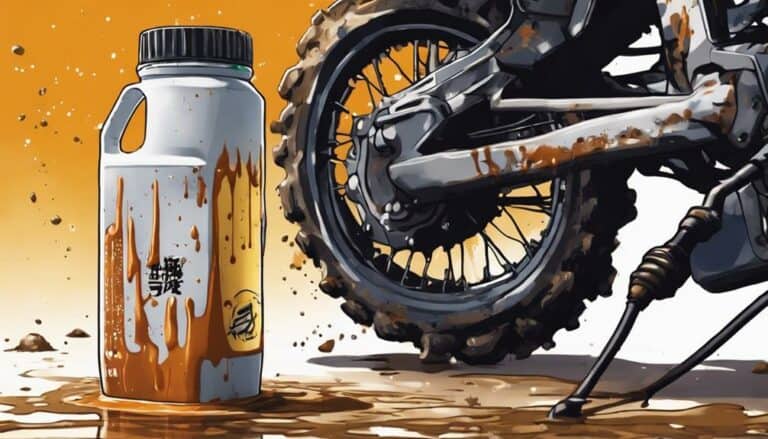When you press the brake lever on your dirt bike, the last thing you expect is for it to feel thick and syrupy. But, have you ever wondered why your brake fluid behaves this way?
Understanding the reasons behind this unusual texture could be important to your bike's performance and your safety. Let's explore the possible causes and solutions for thick and syrupy brake fluid on your dirt bike.
Key Takeaways
- Thick and syrupy brake fluid indicates critical contamination needing immediate attention.
- Moisture infiltration leads to gel-like consistency, compromising braking system effectiveness.
- Professional inspection and flushing are necessary to address thick brake fluid issues.
- Regular maintenance and proper care prevent future brake fluid thickening on dirt bikes.
Common Causes of Thick Brake Fluid
Moisture contamination is a common cause of thickening brake fluid on a dirt bike, affecting its performance and potentially leading to reduced braking efficiency and system damage. When water seeps into the brake fluid, it can cause the fluid to take on a gel-like consistency, making it less effective at transferring hydraulic pressure. This change in the fluid's properties can result in a spongy feel when you apply the brakes, longer stopping distances, and overall reduced braking performance.
Moreover, the presence of moisture in the brake fluid can lead to potential system damage. The water absorbed by the brake fluid can cause corrosion within the braking system, leading to deteriorated components and compromised safety. To prevent this issue, it's essential to engage in regular maintenance practices and store your dirt bike properly. By maintaining the integrity of the brake fluid through proper storage and timely replacements, you can guarantee peak braking performance and extend the lifespan of your braking system.
Effects of Syrupy Brake Fluid
Experiencing syrupy brake fluid on your dirt bike signals a critical issue requiring immediate attention to guarantee peak braking performance. When brake fluid becomes thick and syrupy, it indicates contamination, often due to moisture seepage. This can compromise the effectiveness of your entire brake system, leading to reduced braking power and potential safety hazards.
The syrupy consistency can also be a symptom of the brake fluid being hygroscopic, meaning it absorbs water over time. This moisture contamination can accelerate corrosion within the brake components, risking system failure if left unaddressed.
To mitigate these risks, it's essential to promptly flush and replace the syrupy brake fluid with fresh, uncontaminated fluid. Neglecting this maintenance can result in costly repairs and compromised safety on your dirt bike. Therefore, regular checks and timely actions to maintain proper brake fluid quality are essential for peak braking performance and rider safety.
How to Diagnose Brake Fluid Issues
When encountering thick and syrupy brake fluid on your dirt bike, it's important to conduct a thorough inspection to diagnose potential issues effectively. Contaminated brake fluid, indicated by its unusual consistency, can greatly reduce braking efficiency and even cause damage to the braking system.
Begin by checking the brake fluid reservoir for any debris or sludge that might be present, as these contaminants can lead to the fluid thickening. Overheating is another common cause of brake fluid thickening, which can directly impact braking performance.
If you notice these symptoms, it's advisable to seek a professional inspection to determine the extent of the issue. In many cases, flushing the brake fluid system may be necessary to resolve the problem and restore peak brake function on your dirt bike.
Best Practices for Brake Fluid Maintenance
To maintain best brake fluid performance on your dirt bike, adhere to these best practices for effective maintenance. Regularly flushing and replacing brake fluid is vital to prevent water contamination, as brake fluid is hygroscopic and absorbs moisture over time.
Make sure you use the correct type of brake fluid recommended for your bike to maintain top performance and avoid issues in the brake hydraulics. Inspect rubber diaphragms and seals in the brake systems periodically to prevent fluid thickening and maintain proper function.
Cleaning the reservoir at regular intervals is essential to prevent contamination and thickening of the brake fluid. Additionally, avoid mixing different types of brake fluids, as this can lead to changes in viscosity and consistency, affecting the overall performance of your brakes.
Preventing Thick Brake Fluid in the Future
To prevent thick brake fluid in the future, make sure adequate sealing of the brake fluid reservoir to prevent moisture infiltration. Moisture contamination can lead to the brake fluid thickening over time, affecting its performance.
Additionally, regular maintenance is important. Check and replace the brake fluid at recommended intervals to maintain its proper consistency. When using high-quality brake fluid suitable for dirt bikes, you reduce the risk of thickening and contamination issues.
Be mindful of exposing the brake system to extreme temperatures, as this can also contribute to fluid thickening. By following these steps and ensuring the proper care of your brake fluid, you can help prevent it from becoming thick and syrupy in the future.
Conclusion
To guarantee top performance and safety on your dirt bike, regularly inspect and maintain your brake fluid. By preventing moisture absorption and contamination, you can avoid the problem of thick and syrupy brake fluid.
Remember to flush the system and use recommended brake fluid types to keep your braking system in top condition. Stay proactive in addressing any issues promptly to ride with confidence and efficiency.

